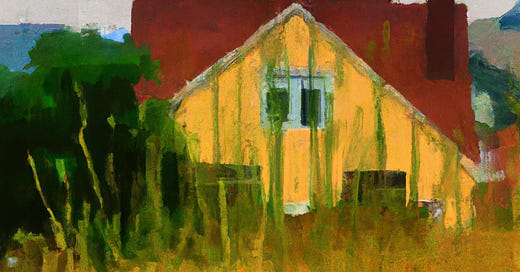One year, when I was a kid, my dad decided to turn the front yard into a meadow. Lawns were absurd, he said. It was crazy to allow only a single type of plant to grow on a big swath of land like it was a crop.
Dad wasn’t wrong about traditional turf, “rewilding” yards by switching to less thirsty plants is a big deal now in the era of mega-drought. But it was a weird stand to take back in the late 70s in a little subsidized development of a dozen or so lots carved into a hilly corner of rural Massachusetts. And it’s even more bizarre if the person making the anti-lawn case is a tall, angular man with curly silver hair and a comically heavy German accent, wearing, I kid you not, an ascot tied at the neck. “Vat is ze point to spend all zis time fighting with plants?” he’d say.
Keeping a lawn green meant constant vigilance and maintenance, neither of which was Dad’s forte. Neighbors spent weekends on patrol for insurgent botanicals, eradicating crabgrass, dandelions, or, god forbid, clover with surgical strikes. On the flip side, grass turf also required endless feeding, watering, and grooming. What a drag if you weren’t someone who took pride in the results.
To Dad, it seemed like an exhausting battle to control a patch of earth that was forever trying to return to its original state. Maybe that tension is what really turned him off. He was a kid in post-war Berlin when it was a city divided into three sectors, each administered by a different country, a place of overlapping borders and mercurial rules.
A few months after Dad decided to go full meadow, we could step out our front door and walk right into a tiny field of Saint Anne’s lace, goldenrod, and thistles, and who knows what. It was all accidental. The original turf grew tall, wooly, and alien-looking because we’d never seen grass that had gotten mature enough to develop seeds. Lawn turf is usually cut halfway through its life cycle and kept that way, like perpetual adolescence.
One of my younger sisters and her friend used to pretend they were horses back then, and they’d disappear into the yard-meadow, galloping along on their hands and knees with only the tops of their heads visible. They eventually wore slender trails through the tall weeds and made a whole universe for themselves. Soon enough, the yard looked like a matted mohawk sprouting up between the neat green crew cuts along our street, the aptly named Shamrock Drive.
All the houses on the street had been built with one chunk of federal money. They came in three styles which appeared in a repeating pattern up and down the street: an A-frame, cape, and barn shape. The lots had been stripped down to the dirt for quick construction. But above and below us were hills and farms with grazing fields, soft-bellied mountains, and woods. Unlike suburbs close to a city, our bare little quarter-acre plots existed within that comforting buffer of old growth.
At the start, Dad mowed and even put up a fence around the backyard like real property owners. Then, sometime during the epically high gas prices of the time, Dad bought a manual push mower. He loved how simple and elegant it was, just a cylinder of twirly blades that hacked the green while a sweaty person forced it forward. After several passes at the front lawn, Dad would come into the kitchen triumphantly, having found one of his favorite things, a two-for-one fix, saying: “Zis is the only exercise I need!”
The thing is, he never figured out how to get the lawn mower blades sharpened, so cutting the grass got harder and slower and less appealing. Then the meadow plan then became a brilliant reason to stop mowing entirely. And you couldn’t exactly rake leaves across a knee-high meadow, which meant even less lawn duty.
If our little town of 4,000 or so people had had more than two or three police officers, we probably would have been reported and fined for dereliction of lawn duty. This is the kind of nonconformity that some suburbs still go nuts over. It seemed like an insult to a specific 20th-century American dream. But mostly, people on our street were likely too busy working two or sometimes three jobs to file complaints. Plus, our unmowed meadow-yard was one of my family’s least odd attributes. It bothered us kids more than anyone else because it was a blow to our quest to be ordinary.
Our house was almost as chaotic on the inside as it was on the outside. We were a clan with four kids, few habits, even less money, and almost no sense of time. So the ritual of mowing and feeding a patch of grass so that it would look a certain way seemed absurd. Mom and Dad found beauty in other places, always pointing out the shifting light on the hills, or the shimmer of the water in the fast and rocky river that followed the highway into town. And Mom loved the mossy, crumbly old New England stone walls and gravestones, slowly being reabsorbed by the earth.
This week, I’ve been thinking about Dad’s meadows and how he decided to stop fighting with plants. Here in the northern parts of the U.S. the last days of lawn mowing are upon us, and the raking is soon to begin. And, more generally, it feels like we’re battling nature more often and more dramatically. In some places, water overwhelms and destroys, and in others, it’s as fleeting and precious as youth.
Out in the arid West, some towns are paying residents to rewild their property. It means abandoning the fight to maintain a living outdoor carpet and yanking out the Bermuda grass turf. Dad would have loved the idea of rewilding and getting money for it. A huge two-fer! But you can’t just stop mowing a turf lawn as he did for his own not-so-environmental reasons, re-introducing local plants is a labor intensive process.
Plus, even with financial incentives, it’s hard to let go of those primal American ideals about what prosperity and order look like. We’ve spent centuries de-wilding everything, including ourselves. We took pride in making great swaths of the desert look like the lush hills of Ireland. And now when the weather, governments and even our own minds seem unpredictable and unsafe, there’s an understandable urge to exercise even tighter control over what we can, like our front yard. It’s so tempting to want the soothing and appealing sight of a neatly trimmed expanse of grass.
Maybe we need to rewild our minds too.
Eventually, Dad’s meadow was cut down, and once all the kids were out of the house, Mom and Dad moved to a sweet place a few miles from the sea. Amazingly, they started to garden with patience and persistence slowly overtaking most of the new front lawn with expanding patches of flowering shrubs and hardy ground cover. Dad got interested in feeding the birds that hung out in that part of the country, and was absolutely transfixed by “zat magnificent cardinal.” The chaos of those years with kids abated, and their perspectives changed. They were able to settle harmoniously into their environment for a while, like those old New England stone walls.
You’re reading the It’s Not Just You newsletter, slightly wicked comfort for anxious times delivered in the form of essays, photos and reading reccos. Subscribe here to get it free in your inbox. And if you love it, please share.
VISUAL DELIGHTS
I ginned up these images with DALL-E, a free A.I. text-to-art application. More about how it works in this earlier newsletter: Why Art Created By Artificial Intelligence Is Irresistible and Horrifying
CHOICE READS
The Real Magic of Rituals: You might call them superstitions or spells, but they genuinely drum anxiety away. Florida’s Fatal Attraction: Everyone wants a piece of it, and that’s the problem. The rise of non-linear workdays “While working asynchronously – keeping different hours to colleagues – workers can complete tasks in flexible, focused bursts scattered throughout their day.” And The Disappearing Art of Maintenance: “Repair is when you fix something that’s already broken. Maintenance is about making something last.”
With the loss of country music icon Loretta Lynn, I’m reminded how controversial her songs were back in the day. And some, alas, are achingly relevant again. “The Pill” was banned on dozens of radio stations when was released in 1975, 15 years after the introduction of oral contraception for women.
“All these years, I've stayed at home while you had all your fun
And every year that's gone by, another baby's come
There's gonna be some changes made right here on Nursery Hill
You've set this chicken your last time 'cause now I've got the pill”








Thanks for a very fine column! I grew up in Salt Lake City, Utah. Kerouac called it the City of Lawn Sprinklers. Wish my folks had thought like your dad!
If only this could become the norm, yet perhaps it will as we face the challenging changes to our planet. Another beautifully written and entertaining ; quite a man your father was!